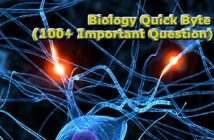Friends, below are the list of important MCQs of Punjab State Teacher Eligibility Test  (PSTET) – Child Development and Pedagogy
- Child Development (Primary School Child)
- Concept of Inclusive education and understanding children with special needs
- Learning and Pedagogy.
Request – If you get any answer wrong. please let us know, we will correct it
Practice Set – 1 | Practice Set – 2 | Practice Set – 3 | Practice Set – 4 | Practice Set -5 | Practice Set – 6
Q-1 Theory of multiple intelligence implies the following except
a) intelligence is a distinct set of processing operations used by an individual to solve problems.
b) disciplines should be presented in a number of ways
c) learning could be assessed through a variety of means
d) emotional intelligence is not related to IQ
Q-2 A child cannot distinguish between ‘saw’ and ‘was’, nuclear’ and ‘unclear’.He/She is suffering from:
a) Dyslexia-
b) word jumbling disorder
c) dyslexemia
d) dysmorphemia
Q-3 Most psychologists believe that development is due
a) Largely to nature.
b) Largely to nurture.
c) To nature and nurture acting separately.
d) To an interaction of nature and nurture.
Q-4 The success of integrated education depends on
a) The support of community
b) The excellence of text-books
c) The highest quality of teaching-learning material
d) The attitudinal changes in teachers
Q-5 Centrally sponsored scheme of Integrated Education for disabled children aims at providing educational opportunities to children with disabilities in
a) regular schools-
b) special schools
c) open schools
d) Blind Relief Association schools
Q-6 The idea of Basic Education is propounded by
a) Dr. Zakir Hussain
b) Dr. Rajendra Prasad
c) Mahatma Gandhi
d) Rabindranath Tagore
Q-7 The in-service teacher’ training can be made more effective by:
a) Using training package which in well prepared in advance
b) Making it a residential programme
c) Using co-operative approach
d) Practising training followup proceduresÂ
Q-8 A time bound testing programme for a students should be implemented in Schools so that
a) The progress of the students should be informed to their parents
b) A regular practice can be carried out
c) The students can be trained for final examinations
d) The remedial programme can be adopted on the basis of the feedback from the results
Q-9 The normal twelve- year old child is most likely to
a) Have difficulty with gross motor coordination
b) Have anxiety feelings about pleasing adults
c) Confine his/her interests to the here and now
d) Be eager for peer approval
Q-10 The most important indicator of quality of education in a school is
a) Infrastructural facilities of a school
b) Classroom system
c) Text-books and Teaching-learning material
d) None of these
Q-11 The development that proceeds in the direction of the longitudinal axis i.e., head to foot is termed as —
a) Cephalo-caudal development
b) Proximo distal
c) Interrelation
d) Intergration
Q-12 The cardinal principles of learner centered education are …………….
a) Learning by doing
b) Learning by living
c) Both
d) None of these
Q-13 You like teaching profession because:
a) it has less responsibility
b) you are interested in it Â
c) it is easy
d) it provide you more holidays
Q-14 The ideal teacher
a) Teaches the whole curriculum
b) Helps his students in learning
c) Is a friend, philosopher and guide
d) Maintains good discipline
Q-15 Which of the following is not related to educational achievement?
a) Heredity
b) Experiences
c) Practice
d) Self learning
Q-16 Good reading aims at developing
a) understandingÂ
b) pronunciation
c) sensitivity
d) increasing factual knowledge
Q-17 The priority to girls education should be given because
a) The girls are more intelligent in comparison than the boys
b) The girls are lesser in number than boys
c) The girls were badly discriminated in favour of boys in the past
d) Only girls are capable of leading for social change
Q-18 The essential element of the syllabus for the children remained out of school should be
a) Literacy competencies
b) Life-skills
c) Numerical competencies
d) Vocational competencies
Q-19 A new lesson being taught by you is not well-understood by the students. What will be your response?
a) Stop the lesson altogether
b) Tell the students to learn it any way
c) Change your method of teaching the lesson
d) Give some related home assignment, hoping that it will make the lesson clearer
Q-20 Which of the following is not necessary for ensuring the success of a programme of ‘Inclusive Education’ in a school?
a) Requisite infrastructure
b) Adequate finances
c) All the teachers of the school should be special resource person
d) Motivated administrators and teachers
Q-21 Adolescents may experience
a) feeling of self-actualization
b) feeling of satiation about life
c) anxiety and concern about themselves
d) feeling of fear about sins committed in childhood)
Q-22………… is the process of determining the context to which an objective is achieved or the qualities envisaged)
a) Measurement
b) Evaluation
c) Both (a) and (b)
d) None of these
Q-23 Who is the father of genetic epistemology?
a) Piaget
b) Bruner
c) Vygotsky
d) Dewey
Q-24 The period of sensory motor adaptation of Piaget is
a) 0-2 years
b) 1-3 years
c) 3-5 years
d) 4-6 years
Q-25 Vygotsky theory implies
a) child will learn best in the company of children having IQ lesser than his/her own.
b) collaborative problem solving
c) individual assignments to each student
d) after initial explanation, do not support a child in solving difficult questions
Q-26 The differences among individuals that distinguish them from one another and make each one a unique individual are denoted by the term ………….
a) Individual difference
b) Heredity
c) Environment
d) Personality
Q-27 The process of expansion of an individual’s capacities quantitatively, should be termed as:
a) Development
b) Growth
c) Equilibration
d) Maturation
Q-28 The best place of social development for a 12 years old child is..
a) Neighborhood
b) Family
c) Playground
d) School
Q-29 The idea of Basic Education is propounded by
a) Dr. Zakir Hussain
b) Dr. Rajendra Prasad
c) Mahatma Gandhi
d) Rabindranath Tagore
Q-30 The process whereby the genetic factors limit an individual’s responsiveness to the environment is known as:
a) Canalization
b) Discontinuity
c) Differentiation
d) Range of reaction
Q-31 Child Labour Prohibition Act (1986)
a) Prohibits all types of child labour upto 14 years of age of child
b) Prohibits child labour in risk-taking works only
c) Prohibits child labour during school hours only
d) Prohibits child labour by imposing the responsibility of children’s education on the employers
Q-32 Of the following, the most promising step for a teacher to take in order to improve class discipline is to
a) Note specific infractions of class rules in the marking book
b) Evaluate his/her materials, methods and approaches to children
c) Consult the class and agree upon a graduated series of punishments
d) Call a parent teacher meeting to discuss the situation
Q-33 The most intense and crucial socialization takes place
a) throughout the life of a person
b) during adolescence
c) during early childhood
d) during adulthood
Q-34 One of, the students of a class hardly talks in the class. How would you encourage him to express himself?
a) By organizing discussions
b) By encouraging children to take part in classroom activities
c) By organizing educational games/ programmes in which- children feel like speaking
d) By giving good marks to those who express themselves well
8.Which of the’ skills do you consider most essential for a teacher?
Q-35 Creative writing should be an activity planned for
a) Only those children reading on grade level
b) Only those children who can spell and also, can write cohesive sentences
c) Only those children who want to write for the newspaper of the class
d) All children
Q-36 In which of the following stages the child looks self-centered?
a) Infancy
b) Early childhood
c) Adolescence
d) Adulthood
Q-37 Which of the’ skills do you consider most essential for a teacher?
a) ability to help children understand texts thoroughly
b) ability to help children do all the exercises
c) ability to raise possible actions from the texts
d) ability to help children from their own opinions on the text
Q-38 The best remedy of the student’s problems related with learning is
a) Suggestion for hard work
b) Supervised study in Library
c) Student Achievement level-
d) Diagnostic teaching
Q-40 Christina took her class for a field trip and after coming back, she discussed the trip with her students. It may be co notated as
a) Assessment of LearningÂ
b) Assessment for Learning
c) Learning for Assessment
d) Learning of Assessment
Q-41 The best remedy of the student’s problems related with learning is
a) Suggestion for hard work
b) Supervised study in Library
c) Student Achievement level
d) Diagnostic teaching
Q-42 Which of the’ skills do you consider most essential for a teacher?
a) to communicate well
b) to use difficult language
c) to impress students
d) to read out the textbook
Q-43 A child has been admitted to your school who belongs to a backward family/background from the cultural viewpoint. You will:
a) Keep him in a class in which, ther are many more students of backward background from the cultural viewpoint.
b) Send a teacher to know more about the backward cultural background of the child)
c) Keep him in a normal class but will make a special arrangements for teaching him, keeping his special needs in view.
d) Advise him to take up vocational education.
Q-44 Irfan breaks toys and dismantles them to explore their components. What would you do?
a) Never let Irfan play with toys
b) Always keep a close watch
c) Encourage his inquisitive nature and channelize his energyÂ
d) Make him understand that toys should not be broken
Q-45 The quality of schools education is exclusively depending upon
a) Infrastructural facilities
b) Financial provisions
c) International support
d) The quality of teacher education
Q-45 Who is the father of genetic epistemology?
a) Piaget
b) Bruner
c) Vygotsky
d) Dewey
Q-46 Nature of children are like
a) Imitative
b) Constructive
c) Imaginative
d) Destructive
Q-47 The question “Will the shy child who never speaks turn into a quiet, shy adult or will the child become a sociable, talkative person?” is concerned with which developmental issue?
a) Maturation
b) Continuity and discontinuity
c) Cultural universals versus cultural relativism
d) Nature and nurture
Q-48 In which of the following stages the child looks self-centered?
a) Infancy
b) Early childhood
c) Adolescence
d) Adulthood
Q-49 is the capacity to acquire and apply knowledge.
a) Personality
b) Intelligence
c) Aptitude
d) Attitude
Q-50 A time bound testing programme for a students should be implemented in Schools so that
a) The progress of the students should be informed to their parents
b) A regular practice can be carried out
c) The students can be trained for final examinations
d) The remedial programme can be adopted on the basis of the feedback from the results
Request – If you get any answer wrong. please let us know, we will correct it
Practice Set – 1 | Practice Set – 2 | Practice Set – 3 | Practice Set – 4 | Practice Set -5 | Practice Set – 6




7 Comments
please recheck question 41
What answer you think.
I think correct answer is option D
Please recheck question no.35